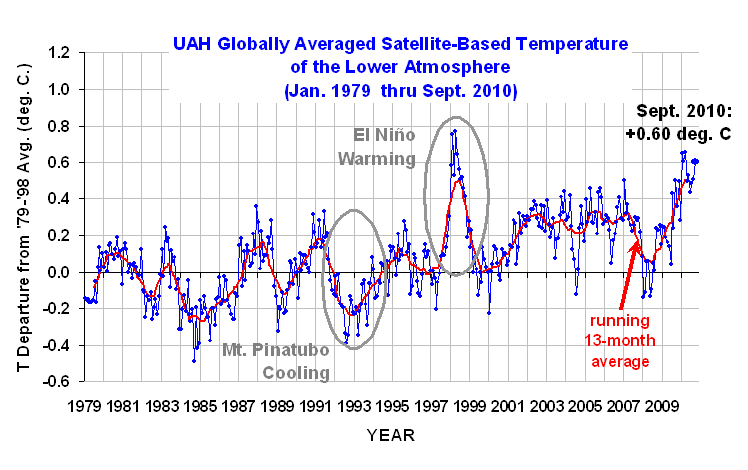NASA reports hottest January to September on record
Hottest September in UAH satellite record, Spencer puzzled by "stubborn" temperatures
by Joseph Romm, Climate Progress, October 14, 2010
Last month, NASA reported it was the hottest January-August on record. That followed a terrific analysis, “July 2010 — What Global Warming Looks Like,” which noted that 2010 is “likely” to be warmest year on record.
This month continues the trend of 2010 outpacing previous years, according to NASA:

It seems all but certain we will outpace 1998, which currently ties for fourth hottest year in theNASA dataset (though it is technically described by NASA folks as tied for the second hottest year with 2005 and 2007).
Outpacing 2005, the hottest year on record, will be closer. In NASA’s surface-based dataset, we are unlikely to set the record monthly temperatures for the rest of this year; last month wasn’t close to the hottest September for NASA. We have entered a moderate to strong La Niña, which NOAA says is “expected to last at least through the Northern Hemisphere winter 2010-11.”
NASA’s surface-based temperature record appears to be the most accurate, as I’ve noted many times (see Finally, the truth about the Hadley/CRU data: “The global temperature rise calculated by the Met Office’s HadCRUT record is at the lower end of likely warming”).
Interestingly, while the disinformers have been breathlessly touting the La Niña as sure to cool things down rapidly, global temperatures have held up, even in the satellite datasets, which are typically sensitive to the El Niño Southern oscillation (ENSO). The more trustworthy RSS data found that it was the hottest September in satellite record.
Remarkably, even Roy Spencer’s much rejiggered UAH data for the lower troposphere shows September 2010 as the hottest on record — a full 0.15 °C higher than September 1998. The UAH anomaly actually jumped from its August level (+0.51 °C), baffling Spencer, who wrote:
Despite cooling in the tropics, the global average lower tropospheric temperature anomaly has stubbornly refused to follow suit: +0.60 °C for September, 2010.Ironically, Spencer anthropomorphises average global temperature — calling it “stubborn” — while refusing to accept the reality of dangerous anthropogenic global warming. The only thing more stubborn than scientific reality is Spencer’s refusal to accept it (see The Great Global Warming Blunder: Roy Spencer asserts, “I predict that the proposed cure for global warming – reducing greenhouse gas emissions – will someday seem as outdated as using leeches to cure human illnesses”).
Spencer then quickly posted an article on falling sea surface temperatures, but his graph of UAH temperatures shows unmistakable decadal warming:
Before this month, I thought 2010 might not be the hottest year in the satellite record, but now it seems like there is a good chance it will — if global temps remain as stubborn as they’ve been (and unrejiggered). Spencer writes:
For those following the race for warmest year in the satellite tropospheric temperature record (which began in 1979), 2010 is slowly approaching the record warm year of 1998. Here are the 1998 and 2010 averages for Julian Days 1 through 273:
1998 +0.590The UAH anomalies for the last three months of 1998 were:
2010 +0.553
1998 10 0.416So that leaves a lot of room for global temperatures to drop in October through December and still have 2010 beat 1998.
1998 11 0.192
1998 12 0.277
Finally, it bears repeating that the record warmth we are seeing this year is all the more powerful evidence of human-caused warming “because it occurs when the recent minimum of solar irradiance is having its maximum cooling effect,” as a recent must-read NASA paper noted:
- NASA: The 12-month running mean global temperature has reached a new record in 2010 — despite recent minimum of solar irradiance: “We conclude that global temperature continued to rise rapidly in the past decade” and “there has been no reduction in the global warming trend of 0.15-0.20 °C/decade that began in the late 1970s.”
Link: http://climateprogress.org/2010/10/14/nasa-hottest-january-to-september-on-record/








No comments:
Post a Comment